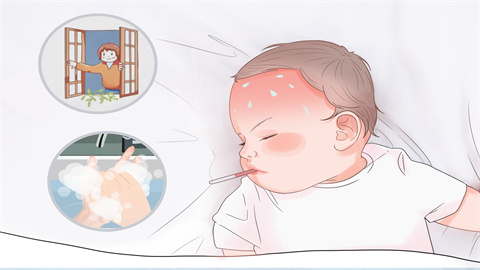What to do when a baby has a fever of 38.2°C
Generally, a baby's fever reaching 38.2°C may be caused by an underdeveloped thermoregulatory center, excessive physical activity or emotional excitement, acute tonsillitis, infantile emergency rash, bronchitis, and other reasons. Treatment methods such as general care and medication can be adopted under a doctor's guidance. Detailed analysis is as follows:

1. Underdeveloped Thermoregulatory Center
A baby's thermoregulatory center is not yet fully developed and is relatively sensitive to changes in ambient temperature, making body temperature more likely to rise due to external factors. In daily life, maintain a suitable indoor temperature to prevent the baby from becoming too cold or hot; dress the baby appropriately, avoiding excessive bundling or chilling.
2. Excessive Physical Activity or Emotional Excitement:
When a baby engages in excessive physical activity or experiences emotional excitement, heat production in the body increases, and if heat dissipation is delayed, it may lead to elevated body temperature. It is recommended to appropriately manage the baby's physical activity and rest periods, avoiding prolonged vigorous exercise; maintain emotional stability in the baby and avoid excessive excitement.
3. Acute Tonsillitis
Acute tonsillitis is caused by viral or bacterial infection, which may lead to congestion and swelling of the tonsils, causing inflammatory reactions and resulting in a fever of 38.2°C. It is typically accompanied by symptoms such as sore throat and difficulty swallowing. Under a doctor's guidance, medications such as Cefaclor Granules, Ribavirin Oral Solution, and Paracetamol Oral Solution may be used for treatment.
4. Infantile Emergency Rash
Infantile emergency rash is caused by infection with human herpesvirus 6. High fever is one of the typical symptoms of infantile emergency rash, often accompanied by mild cough and runny nose. Under a doctor's recommendation, medications such as Acyclovir Granules, Xiao'er Chuiqiao Qingre Granules, and Ibuprofen Suspension Drops may be used for treatment.
5. Bronchitis
Bronchitis is mostly caused by infections such as viruses, bacteria, or mycoplasma, which may cause congestion and edema of the bronchial mucosa, leading to inflammatory reactions and elevating body temperature to 38.2°C. It may also be accompanied by symptoms such as coughing with phlegm and difficulty breathing. Patients may follow medical advice to use medications such as Amoxicillin and Clavulanate Potassium Granules, Oseltamivir Phosphate Granules, and Xiao'er Huatan Zhike Granules for treatment.
In daily life, ensure good indoor air circulation by regularly opening windows for ventilation, keep the indoor air fresh, and reduce bacterial and viral growth.




